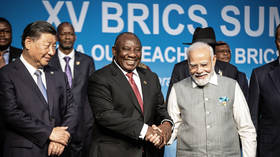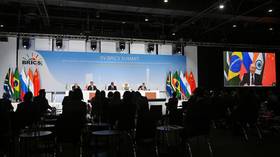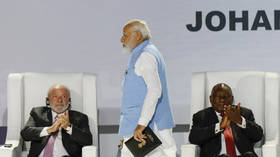How one new member can complicate things for BRICS
Argentina’s upcoming presidential election highlights the international group’s primary challenge

The 15th BRICS Summit in South Africa has finally kicked off and a lot of murmurs are making their way through the media. Most of us in the political commentary business planned for this, as, after all, it has been one of the most hotly anticipated events this year. Governments, like China’s, are pushing to make the bloc, comprised of Brazil, Russia, India, China, and South Africa, a rival to the G7, while Western governments clearly do not want that to happen.
With the growing trend – both in real terms and in terms of policy planning – of de-dollarization, the South Africa summit was billed as a watershed moment for the greenback since the expansion of BRICS – which is mulling a basket currency for international trade – was to be the most important agenda item, as countries fall over each other to join. And, now, as the event continues, we are already seeing people inject their hopes and fears into what’s happening. While it would be prudent to refrain from overt speculation or promises that, indeed, the Global South is throwing off the chains of ‘imperialismo norteamericano’, one issue has sent rumors swirling in the run-up to the summit: Argentina.
Buenos Aires is slated as a key addition to the bloc, one of the first six new members to be taken on board since BRICS’ only previous expansion in 2010. Closed-door discussions of the beleaguered country’s accession were reportedly high on the ongoing summit’s agenda. We do know that, for one, Brazilian President Luiz Inacio Lula da Silva voiced his support for Argentina’s membership.
But we also know that Argentina didn’t send its own delegation to South Africa even though President Alberto Fernandez was invited to be a speaker. We also know that the country’s economy minister (and presidential candidate), Sergio Massa, instead went to the US to meet with officials from the International Monetary Fund (IMF) about the country’s debt. An Argentine official in Washington was quoted in the media as saying that “the IMF and the BRICS are two very different families,”suggesting that Buenos Aires cannot be in both.
It also must be said that Argentina faces a tough presidential election in October of this year. The far-right economist Javier Milei won a stunning primary election and will face off against the center-left Massa, shocking markets and polite society alike. He has promised to cut off trade relations with China and reorient Argentina toward the “civilized world,” or “the West,” as he said, and to implement a radical market-driven economic policy similar to Chile’s former dictator, Augusto Pinochet. Milei also spoke last week to IMF officials, assuring them that he’s their man.
Finally, we know that BRICS has now formally invited six new members, including Argentina. Their membership is set to be finalized starting January 2024. But if Milei wins the presidential election in the interim, it is almost certain that his country will be suddenly withdrawn from the bloc. This would hurt every member of the group and irrevocably harm BRICS’ image. For the center-left in Argentina, aligning with the West is an undesirable situation. They see it as a foolhardy move because the IMF debt lopped on the country by Washington, and their yes-man former president, Mauricio Macri, is essentially the cause of Argentina’s current woes.
The overarching reality highlighted by Argentina’s situation is that, despite all the hype around this latest BRICS summit and the membership growth spurt it has brought, every member nation has to contend with the realities of its own geopolitics and foreign policy.
Brazil’s Lula, considered a democratic partner of the West sometimes and voice for an independent Global South other times, has to balance these conflicting identities. He does not want to totally overthrow the existing order of international relations – but he also wants to see some changes, which is understandable. India has also positioned itself against BRICS expansion, hoping to dampen the organization’s push for an independent financial system because it has a strong strategic relationship with the US, while also still being a key member of the Global South. Accepting six new members was essentially a compromise for these two countries.
In the end, one thing is crucial to understand in international relations: Countries pursue their own self-interest. It’s as simple as that. Expanding BRICS is in the profound interest of Russia and China, the former of which is being cut off from Western finance over the conflict in Ukraine and the latter is in the crosshairs for a similar fate, which the other current BRICS members are not facing – at least not right now. Russia and China are also far more consolidated in terms of state power compared to governments in the Global South that are susceptible to foreign influence and coups.
One of the strengths and weaknesses of BRICS is that it is not ideological. Non-ideological cooperation is a blessing because it has the possibility to withstand the test of elections, but it’s a liability because it means that the general enthusiasm for building a long-term project is lower, plus an election (or a coup) also has the possibility to upend it if an extremist is elected. This ultimately means that for BRICS to remain worthwhile, it has to produce tangible results that politicians can show to their domestic audiences. Perhaps, to that end, if Argentina is promised fresh cash, it will end up joining whatever the result of its presidential election.
But the unpredictability, and the resulting fragility, of some Global South governments will undoubtedly be the perennial challenge for BRICS.




No comments:
Post a Comment